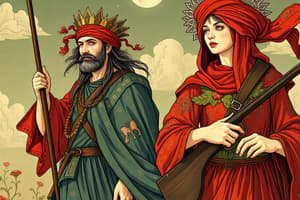Podcast
Questions and Answers
What is a key motivation for freedom fighters?
What is a key motivation for freedom fighters?
- Political independence and social change (correct)
- Corporate power enhancement
- Economic profitability
- Personal fame and recognition
Which of the following is a common challenge faced by freedom fighters?
Which of the following is a common challenge faced by freedom fighters?
- Excessive funding and resources
- Opposition from established authorities (correct)
- Overwhelming public support
- Lack of political engagement
Which characteristic is least associated with freedom fighters?
Which characteristic is least associated with freedom fighters?
- Strong belief in principles of justice
- Desire for personal wealth (correct)
- Courage in the face of adversity
- Charisma and leadership
What form of resistance is NOT typically employed by freedom fighters?
What form of resistance is NOT typically employed by freedom fighters?
What is one way freedom fighters adapt their strategies?
What is one way freedom fighters adapt their strategies?
Which of the following historical figures is cited as an exemplary freedom fighter?
Which of the following historical figures is cited as an exemplary freedom fighter?
Which type of resistance focuses on community mobilization and societal reform?
Which type of resistance focuses on community mobilization and societal reform?
What is a significant personal cost often faced by freedom fighters?
What is a significant personal cost often faced by freedom fighters?
Which term best describes the use of ideology by freedom fighters?
Which term best describes the use of ideology by freedom fighters?
What culminates in the ability to inspire and mobilize support among freedom fighters?
What culminates in the ability to inspire and mobilize support among freedom fighters?
Flashcards
Freedom Fighter
Freedom Fighter
A person who actively opposes oppression, injustice, or tyranny to achieve political independence or social change.
Armed Struggle
Armed Struggle
Direct confrontation, often with violence, to resist a power structure.
Civil Disobedience
Civil Disobedience
Non-violent resistance to laws or policies considered unjust.
Political Activism
Political Activism
Signup and view all the flashcards
Social Movements
Social Movements
Signup and view all the flashcards
Historical Figures
Historical Figures
Signup and view all the flashcards
Challenges Faced
Challenges Faced
Signup and view all the flashcards
Dedication & Sacrifice
Dedication & Sacrifice
Signup and view all the flashcards
Inspirational Leadership
Inspirational Leadership
Signup and view all the flashcards
Motivations for Fighting
Motivations for Fighting
Signup and view all the flashcards
Study Notes
Defining Freedom Fighters
- Freedom fighters are individuals who actively resist oppression, injustice, or tyranny to achieve political independence or social change.
- Their actions typically involve challenging a dominant power structure, often through armed struggle, civil disobedience, or other forms of protest.
- Motivations can vary, encompassing national liberation, social equality, religious freedom, or individual rights.
Historical Context of Freedom Fighters
- The concept of freedom fighters is deeply rooted in human history, spanning various eras and geographical regions.
- Examples from ancient civilizations to modern times illustrate different forms of resistance.
- Historical figures like Gandhi, Mandela, and Martin Luther King, Jr., are often cited as exemplary freedom fighters.
Key Characteristics of Freedom Fighters
- Dedication and commitment to a cause, often involving significant personal sacrifice.
- Strong belief in principles of justice, equality, and freedom.
- Ability to inspire others and mobilize support through leadership and charisma.
- Courage to confront adversity and face potential challenges, including violence, imprisonment, or death.
- Ability to adapt strategies and tactics based on changing circumstances.
- Often operating within complex political, social, and economic contexts, facing varying forms of opposition and resistance from oppressors.
- Strategic use of ideology, propaganda, and public opinion to gain support for their cause.
- Ability to maintain morale amongst themselves and their supporters.
Types of Resistance by Freedom Fighters
- Armed struggle, including guerilla warfare and direct confrontation.
- Civil disobedience, involving non-violent resistance to unjust laws and policies.
- Political activism, through organizing protests, demonstrations, and lobbying efforts.
- Social movements, focusing on community mobilization and advocating for societal reforms.
- Intellectual and cultural resistance, through producing art, writing, or other forms of expression that challenge the status quo.
Challenges Faced by Freedom Fighters
- Opposition from powerful and established authorities, including military forces, police, security services, and governments.
- Internal conflicts and disagreements amongst various factions, which may hinder or compromise their work.
- Lack of resources and support, including funding, weapons, and personnel.
- Risks associated with violence, including harm or death to themselves and their supporters.
- Political isolation and international pressure from powerful nations or alliances supporting the oppressive regime.
Lasting Impact of Freedom Fighters
- The actions of freedom fighters often result in long-term societal and political change.
- Freedom fighters help shape nations, societies, and cultures in fundamental ways.
- Their historical impact can serve as inspiration and a model for future generations.
- Movements led by freedom fighters frequently lead to the establishment of new governments, reforms, or societal advancements.
- Their contributions often involve creating new political systems or inspiring similar movements elsewhere in the world.
Studying That Suits You
Use AI to generate personalized quizzes and flashcards to suit your learning preferences.




